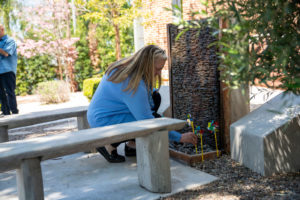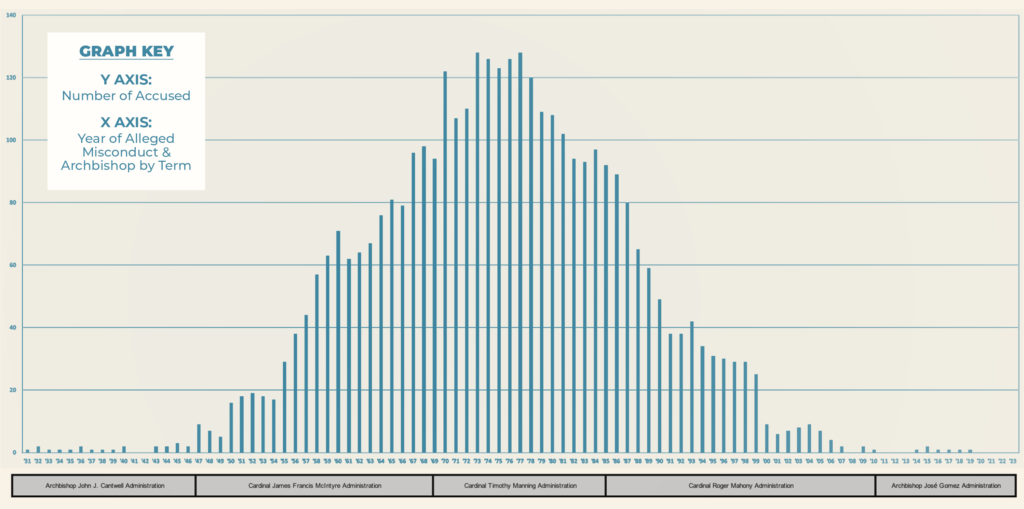The Archdiocese of Los Angeles has reached an agreement in principle worth $880 million to compensate more than a thousand decades-old claims of childhood sexual abuse.
Announced Wednesday in a joint statement from archdiocesan counsel and a committee of plaintiffs’ lawyers, the global settlement caps a yearlong mediation process that followed California’s three-year revival of civil claims of past sexual abuse involving minors.
The 1,353 claims to be compensated by the agreement are based on allegations against priests, other clergy, women religious and lay people from the archdiocese, along with religious order priests and clergy from other dioceses who were serving in the archdiocese.
“I am sorry for every one of these incidents, from the bottom of my heart,” wrote Archbishop José H. Gomez in an Oct. 16 letter to LA Catholics. “My hope is that this settlement will provide some measure of healing for what these men and women have suffered.”
Most of the allegations covered by the agreement happened more than 50 years ago, including some dating back to the 1940s. These allegations were previously time-barred under California’s statute of limitations law, which requires that childhood sexual abuse claims be filed before the alleged victim’s 26th birthday.
But in 2019, California Gov. Gavin Newsom signed Assembly Bill 218, which opened a three-year “lookback window” that allowed old claims to be filed from the beginning of 2020 through the end of 2022. It also permanently extended the age for reporting childhood sexual assault from 26 to 40.
The window led to some 4,000 total claims against Catholic dioceses in California, including some 1,900 in which the LA Archdiocese was named.
In the global settlement announced Wednesday, the archdiocese affirmed that none of the settled claims involved allegations against priests currently in ministry.
There were some allegations filed against individuals currently in ministry. These were investigated by the archdiocese’s independent review board, but none were substantiated “based on the information available during the investigation,” according to a fact sheet published by the archdiocese.
In his letter, Archbishop Gomez emphasized that as a result of reforms in archdiocesan procedures, “new cases of sexual misconduct by priests and clergy involving minors are rare in the archdiocese.” He added, “No one who has been found to have harmed a minor is serving in ministry at this time.”

The $880 million agreement follows settlement plans announced by other Catholic dioceses in the U.S. where state legislatures had passed similar window laws.
Settlements stemming from AB 218 involving other institutions in California can also be expected under the law. Last year, LA County officials predicted they may have to spend up to $3 billion to compensate some 3,000 historic sex abuse claims brought by victims in county facilities such as foster homes and probation halls.
In California, the fallout from AB 218 was cited in recent bankruptcy announcements by other Catholic dioceses, including Fresno, Oakland, Santa Rosa, Sacramento, San Diego, and the Archdiocese of San Francisco.
In the case of Los Angeles, the largest Catholic archdiocese in the country and one of the largest worldwide, archdiocesan officials indicated that a bankruptcy filing was not a financially sound solution.
Archbishop Gomez said the archdiocese would fund its settlement through a combination of archdiocesan reserves and other assets, as well as loans and payments that can be expected from other parties named in the lawsuits, like religious orders.
The archbishop stressed that no funds would be used from parishes or school donations or archdiocesan-wide collections and campaigns like Together in Mission and Called to Renew.
He acknowledged that “in the months ahead there will be a great deal of uncertainty and hard decisions will be required.”
The agreement reached “in principle” means that final implementation is contingent on the approval of a specified number of claimants involved in the global settlement.
If approved, the archdiocese would make payments in 2025 and 2026.
This is the second time the LA Archdiocese has reached a global settlement of abuse claims. More than 500 claims were made against the archdiocese the first time California lifted the statute of limitations in 2003, resulting in a settlement in 2007.
Between examining witness testimony, conducting new interviews, and reviewing historical records, the litigation process that results from “look-back laws” is always time-consuming and tedious, former FBI official and sex abuse protection expert Kathleen McChesney told Angelus.
“There’s nothing easy about any of this,” said McChesney. “You don’t always have the best information because people’s memories fade, there’s not necessarily documentary evidence, and witnesses or alleged offenders have disappeared or are deceased.”
McChesney served as the first director of the U.S. Bishops’ Office of Child Protection, launched in 2002 when the clerical abuse crisis first hit the U.S. Church.
Since then, she said, the LA Archdiocese has helped lead the way on child protection and accountability efforts among U.S. dioceses.
“They have a very robust program for dealing with cases addressing new allegations, they have exceptional victim advocacy and support,” said McChesney, who now runs Kinsale Management Consulting, a firm that advises institutions and dioceses on abuse accountability and child protection.
Asked whether settlements like these represent a new chapter in the U.S. Church’s fight against child sex abuse, McChesney believes the steep drop in recent cases proves dioceses like LA have taken the right approach.
“The Church is doing very well writ large,” said McChesney. “It’s not a problem that is likely to be a hundred percent eliminated, but that is the goal.”

